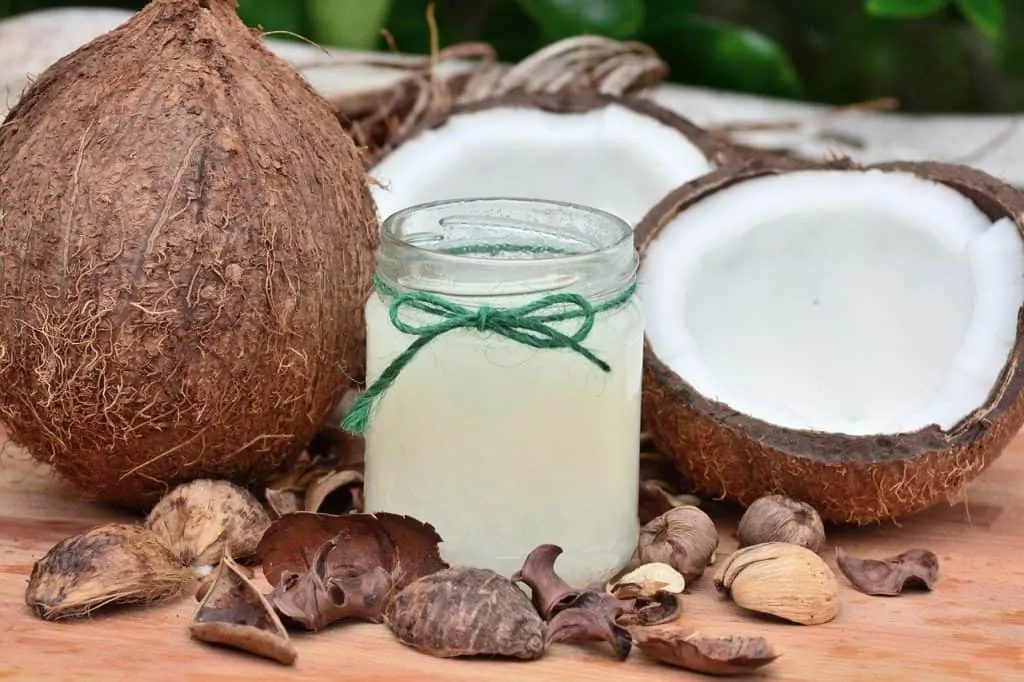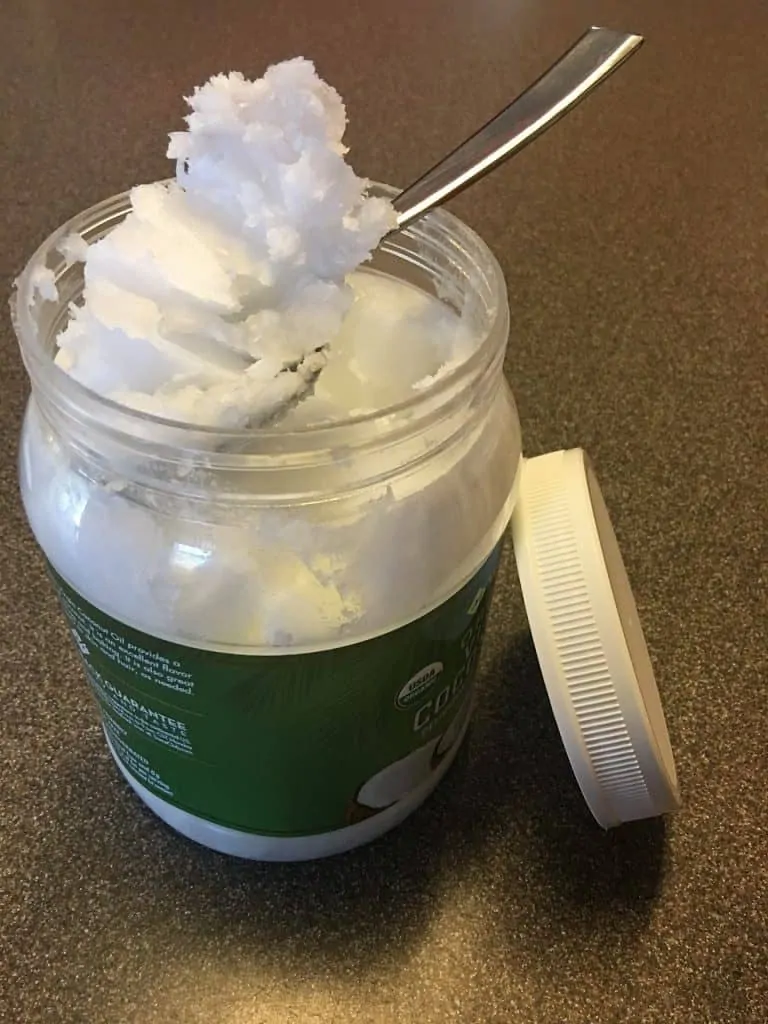Humans have been using coconuts for medicinal, dietary, and vanity purposes for centuries. Throughout the world, coconuts are renowned for their healing properties and immune-boosting abilities, with uses that range from digestive health to hair and skin benefits.
But did you know that coconut oil for dogs also has its benefits? That’s right, this wonderful drupe (not a nut, despite its name), is rich in all kinds of supplemental benefits for both the two-legged and the four-legged community.
That said, it’s also important to note that coconut oil is not a cure-all for every ailment you or your dog may face, as some outlets, claims and sources might have us believing.
In fact, before you give your dog coconut oil, we should note that not all experts agree with its wide range of benefits and recent studies have even shown that too much coconut oil for dogs can actually be dangerous.
With that in mind, let’s go ahead and learn more about coconut oil for dogs, it’s benefits, uses, recipes, and when to stay away from it.
But before we begin, let’s answer the most basic of questions. What is coconut oil?
Contents
What Is Coconut Oil?
Coconut oil is derived from the meat of the inside of the coconut and is rich in beneficial properties.
The palm tree has long been synonymous with visions of paradise-like islands, pirates, and yes, coconuts.
Coconuts, which we now know are not actually nuts but instead considered drupes, are a seed (or fruit) that derives from the palm tree family. These drupes are the only known living species belonging to the genus Cocos.
Inside the coconut is the “meat”, which is the white, edible part that surrounds the liquid coconut milk. Coconut oil, also known as copra oil, is the oil which is extracted from this meat. It must be extracted from mature coconut meat in order to be harvested properly.
As we mentioned above, coconut oil is popular throughout the world for its many uses. Medicinally, coconut oil has been shown to help aid in weight loss, boost cognitive function, reduce inflammation, assist in the healing of wounds, condition hair, revitalize skin, and much more. When it comes to dogs, coconut oil can be just as beneficial for both topical and oral uses.
Why Coconut Oil?
Part of what makes coconut oil so special is that it contains a good amount of Medium Chain Triglycerides, or MCTs. MCTs are primarily responsible for aiding in all these benefits we have listed above.
Because dogs do not have access to many MTCs in their natural diet, introducing coconut oil is a safe way for them to reap the benefits that MTCs have to offer.
That said, coconut oil also contains a very large amount of saturated fat, which can have adverse side effects, especially when it comes to dogs.
Keep reading.
Is Coconut Oil for Dogs Really Safe? What You Should Know Before Giving Your Dog Coconut Oil
Not all experts agree that coconut oil is good for dogs.
Our dogs are members of the family, which is why many of us look for alternative ways to keep them safe, improve their quality of life, and elongate their lifespan. Coconut oil has long been touted as a wonder-nut for all things dog-related, though recent studies have also exposed some not-so-wonderful truths about this otherwise healthy oil when it comes to dogs.
While most uses for coconut oil can be wonderful for your dog when given topically, there are some instances where certain dogs can be more at risk of suffering from adverse side effects than others when they ingest coconut oil.
Potential Dangers of Coconut Oil for Dogs When Given Orally
- Digestive Upset
- High cholesterol
- Hardened Arteries
- Increase Weight Gain
- Hyperlipidemia
Giving your dog coconut oil certainly can aid in a number of health benefits, which we will discuss in more detail below, but coconut oil can also be harmful if not given in the proper dosage or if given to a dog who is sensitive or suffers from underlying health conditions.
Before introducing your dog to coconut oil, we recommend consulting with your veterinarian. Furthermore, we suggest avoiding giving your dog coconut milk, coconut water or coconut meat.
But while coconut oil does have its risks, don’t count it out. When used properly and given in the right dosage, coconut oil for dogs can be highly beneficial.
Take a look.
Coconut Oil for Dogs – Beneficial Uses
When used properly and under the guidance of a veterinarian, coconut oil can be beneficial for dogs.
Yes, coconut oil does have its risks. But it also has its benefits when used correctly. Let’s go over a quick list of all the ways coconut oil can benefit your dog.
- Weight Loss
- Skin and Coat Health
- Alleviate Skin Allergies
- Alleviate Dry Skin
- Alleviate Cracked Paw Pads
- Alleviates Hot Spots
- First Aid
- Oral Health
- Repel Fleas and Ticks
- Improve Brain Function
- Boost Your Dog’s Immune System
- Increase Your Dog’s Energy
- Help Alleviate Arthritis and Joint Pain
Let’s learn more.
Coconut Oil and Dog Weight Loss
The MCTs in coconut oil can help balance the thyroid and aid in healthy weight loss.
Weight gain in dogs can lead to a number of other, more serious health concerns including:
- High Blood Pressure
- Diabetes and Insulin Resistance
- Respiratory Difficulties
- And Liver Disease
While coconut oil does contain high amounts of saturated fats, it is much less likely to be stored in your dog’s system as fat and generally used instead as fuel. The medium chain fatty acids in coconut oil (the MCTs) also balance the thyroid.
This is one of the reasons coconut oil helps to boost energy levels in dogs.
However, coconut oil for dogs will only work by boosting in weight loss when used properly. The quality of coconut oil you use will make a difference in the amount of weight your dog loses, as will your dog’s overall diet, activity level, age and breed.
Remember, dogs who are prone to gaining weight quickly could end up having an adverse reaction to coconut oil, which could lead to them gaining even more weight. Consult with your veterinarian before giving your dog coconut oil in an effort to aid in weight loss to ensure he is a good candidate.
Coconut Oil for Skin and Coat Health
Coconut oil can help aid in skin and coat health in dogs and even reduce shedding.
Coconut oil contains lauric acid. Lauric acid is a beneficial fatty acid that makes up nearly half of the fatty acids present in coconut oil. While many other fatty acids can benefit skin and coat health in dogs, lauric acid has been shown to work quicker and help maintain coat and skin health for longer.
The lauric acid in coconut oil for dogs can help improve:
- Coat appearance
- Coat sheen
- Hot spots
- Skin allergies
- Dry skin
- And Shedding
Make your own coconut oil dog shampoo:
Ingredients:
- ½ Cup of Castile Soap
- ¾ Cup of Water
- ¼ Cup of Coconut Oil
- 5 Drops of Lavender Essential Oil
- 1 Large Jar or Bottle (For Mixing)
Directions:
Mix the above ingredients in the jar or bottle and combine it well. Put your dog in the bathtub and rinse him thoroughly with clean, warm water before lathering him up with the coconut oil shampoo.
Rinse and repeat as needed.
Coconut Oil for First Aid
Coconut oil can help heal cracked paws, hot spots, and minor cuts and scrapes.
Lauric acid isn’t just great for your dog’s coat and skin health. In fact, lauric acid is commonly used in a number of medicinal products including anti-parasitic, antifungal, and antiviral medications and ointments.
Because coconut oil is made up of roughly half lauric acid, it’s no wonder it would make for a safe and effective topical ointment for your dog.
Coconut oil has also been proven to prevent or fight fungal, bacterial and yeast infections. Plus, its anti-inflammatory properties help boost collagen production and reduce swelling, helping ease pain and increase the rate of healing.
Using Topical coconut oil for dogs can aid in:
- Healing cuts and scrapes
- Relieving bug bites
- Alleviating hot spots
- Alleviating burns
- Heal cracked paw pads
Wondering how to use coconut oil for your dog topically? Simply apply a small amount of virgin coconut oil on your dog’s wound or injured area and wrap the wound if you can. It’s important to wrap the wound when you can because coconut oil is sweet and smells good to dogs, and this could entice them to want to lick the oil off.
While it is safe for dogs to lick the oil off in small amounts, doing so could lead to slower rates in healing of the wound and even infection.
Do Not Use Coconut Oil for Dogs on Wounds That:
- Will not stop bleeding
- Are very deep
- Require medical attention
- Require stitches
- Look badly infected
Remember, coconut oil for dogs is a healing aid for minor cuts or skin abrasions and is not intended to replace professional medications or veterinary care. If ever in doubt, always contact your veterinarian.
Coconut Oil for Oral Health
Brushing your dog’s teeth with coconut oil can help reduce bad breath.
Lauric acid, it appears, is the magic ingredient that makes coconut oil for dogs so powerful and beneficial. Not only does it aid in doggy first aid, weight loss, and skin and coat health, but the high levels of lauric acid in coconut oil also make for a wonderful oral cleanser.
Both humans and dogs can brush their pearly whites with coconut oil, but for dogs the benefits are numerous. Coconut oil can help assist your dog in reducing the chances of gum disease, alleviating bad breath, and even reducing bacteria buildup that leads to premature tooth decay and tooth loss.
Doggy toothpaste can be expensive, but you can make your own toothpaste using coconut oil and a few basic household ingredients. Here’s how.
Homemade Coconut Oil Toothpaste for Dogs
Ingredients:
- ¼ Cup of Coconut Oil
- 1 Cube of Beef or Chicken Bullion
- 3 Tablespoons of Baking Soda
- 5 to 7 Fresh Mint Leaves
- 1 Tablespoon of Ground Cinnamon
Directions:
Combine the above ingredients and blend them together into a paste. To brush your dog’s teeth, you can use a pea-sized amount on a soft-bristled toothbrush, a clean dish rag, or even your finger.
Gently scrub your dog’s teeth with the mixture above using the tool you have on hand. The mixture is safe for your dog to ingest and swallow in small dosages. Brush your dog’s teeth with this coconut toothpaste once or twice a day for best results.
The concoction should last about three weeks when refrigerated.
Coconut Oil to Repel Fleas and Ticks
Massaging coconut oil into your dug’s fur can help repel and even kill fleas and ticks.
Coconut oil for dogs can be used to repel fleas and ticks and can be given to dogs both orally and topically. If your dog is sensitive or you are concerned about the potential side effects of coconut oil for dogs when given orally, we suggest simply using it as a topical solution for flea and tick control.
Coconut oil kills fleas and ticks on contact, so it is an excellent and natural tool you can use to eliminate the pests if you suspect your pet is infested. Simply place your pet in a bathtub and massage him liberally with virgin coconut oil.
The oil will envelope any fleas or ticks on his skin, suffocating and killing them. The scent of coconut oil should last for a few days or weeks and help repel future pests as well.
Coconut Oil for Dogs – Homemade Flea and Tick Repellent
Ingredients:
Essential oils you can use include tea tree oil, lemon oil, eucalyptus oil, peppermint oil, rosemary oil, cedar oil, neem oil or lavender oil.
- 5 Drops of The Essential Oil of Your Choice
- Coconut Oil
Directions:
Apply a liberal amount of coconut oil to your hands and add the essential oil of your choice. Then massage the oil into your pet’s fur and skin. Make sure you do not leave the oil only on the surface of your dog’s coat, as it must get to the skin in order to be effective.
Also make sure to apply the oil to his paws, between his toe pads, under his belly, around his ears, and in his armpits.
Coconut Oil to Improve Your Dog’s Brain Function
Senior dogs can especially benefit from coconut oil.
Like humans, when dogs age they are prone to suffering from cognitive decline. In fact, it is not uncommon for many dogs to suffer from doggy dementia and other cognitive issues.
In aging dogs, coconut oil can be highly beneficial as it helps to aid in memory function. In fact, a study conducted in 2010 found that coconut oil provided much needed energy to dogs’ brains in the form of ketones, which helped repair memory function and overall brain health.
The results were healthier, happier dogs who were less prone to suffering from dementia and other cognitive decline as a result of natural aging.
Choosing the Best Coconut Oil for Dogs
The best coconut oil for dogs is virgin coconut oil that has been cold-pressed.
Not all coconut oil for dogs is made equally, and because coconut oil can pose some risk to our four-legged friends, it’s important to pick the best products you can before introducing coconut oil to your fur kid.
According to experts, the best coconut oil for dogs is going to be virgin coconut oil. It is best to find coconut oil that is also cold pressed, as this oil is going to contain the highest level of beneficial nutrients due to the method of processing after the coconuts are harvested.
Because organic, virgin coconut oil is a natural, plant-based product, it generally can come in different textures, smells, tastes and even colors depending on the brand you buy. If you’re not sure which brand of coconut oil would be best for your dog, speak with your veterinarian.
While there are brands of coconut oil for dogs available, you can also use human-grade coconut oil so long as it is processed properly. And certainly, steer clear of coconut oils that contain additives like artificial sugars, fillers, or dyes.
Coconut Oil for Dogs – Our Favorite Treat Recipes
Making your own coconut oil dog treats is simple.
If you’re excited about the benefits of coconut oil for dogs and would like to introduce coconut oil into your dog’s diet, we have some delightful recipes your dog is sure to love.
Take a look.
Peanut Butter Coconut Oil Dog Treats Recipe
Ingredients:
- 1 Cup of Virgin, Cold Pressed Coconut Oil
- 1 Cup of Creamy Organic Peanut Butter (Free of artificial sugars and Xylitol)
- 1 Teaspoon of Ground Cinnamon
Directions:
Combine the above ingredients into a pot and place the pot over a boiler on medium. Stir until the mixture is melted and combined. Once smooth, you can pour the mixture into an ice tray. Some people opt to purchase special silicone trays that mold their treats into cute shapes like hearts or bones. This is up to you, of course.
Freeze the tray until the treats are solid, then remove them from the tray and store them in a bag or container in the refrigerator.
Frozen Coconut Oil and Banana Dog Treats Recipe
Ingredients:
- 2 Overly Ripe Bananas
- 1 Cup of Creamy Peanut Butter (Free of artificial sugars or Xylitol)
- 1 Cup of Virgin, Cold Pressed Coconut Oil
Directions:
Melt coconut oil and peanut butter in the stove on low to medium heat. While you’re doing this, mash your bananas in a bowl. You can do this by hand, or you may use a fork, food processor or blender.
Once the bananas are smashed, add your melted coconut oil and peanut butter to the bowl and mix thoroughly. Pour the mixture into an ice tray or silicone baking tray and freeze the treats until they are solid.
Remove them from the tray and store them in the fridge or freezer.
Mint Coconut Oil Dog Treats and Breath Refreshers
Ingredients:
- ½ Cup of Virgin, Cold Pressed Coconut Oil
- ½ Cup of Organic Chicken Broth
- ½ Cup of Plain Greek Yogurt
- ½ Cup of Parsley
- ½ Cup of Mint
- 1 Blender
- 1 Ice Tray or Silicone Tray
Directions:
Blend the coconut oil, chicken broth and Greek yogurt until the mixture is completely smooth and liquid. Then add the parsley and mint. Pulse the blender until the mint and parsley are smooth, then pour the mixture evenly into an ice tray.
Freeze the treats until they are solid. You may store them in the tray or remove them and store them in a container in the freezer until needed.
Frozen Coconut Oil and Blueberry Dog Treat Recipe
Ingredients:
- ½ Cup of Virgin, Cold Pressed Coconut Oil
- 1 Cup of Frozen Blueberries
- 1 Ice Tray
Directions:
Simply add a few blueberries to your ice tray or silicone tray, then melt your coconut oil for dogs over the stove until it is liquid. This won’t take long. Once it is liquid and has cooled a moment, pour the coconut oil into the tray and cover the berries.
Freeze the treats until they are solid. You can then remove them from the tray and store them in a container in the freezer until your dog is ready for his coconut oil treats. That said, only give these treats in moderation.
Too much coconut oil can result in stomach upset and digestive issues if too many are ingested or if the coconut oil treats are not introduced properly.
Coconut Oil for Dogs – Products We Love
The below products are made specifically for dogs.
Not everyone has time to make their own coconut oil for dogs treats. If you’re short on time but still want to introduce coconut oil to your dog, there are plenty of products you can purchase to help make your dog’s life better and your life easier.
We have listed some of our favorite coconut oil for dogs products below for you to consider.
Raw Paws Organic Virgin Coconut Oil for Dogs and Cats
No products found.
The above coconut oil is specifically made for your four-legged friend and is designed to help utilize all the benefits coconut oil for dogs has to offer. This product can be used for overall coat health, conditioning, flea and tick control, allergy relief, oral health, digestion, and more.
Of course, before using this coconut oil orally for your dog we suggest considering the risks and side effects and making sure you are giving your dog the proper dosage. If ever in doubt, make sure you speak with your veterinarian.
K9 Granola Factory Coconut Crunchers
No products found.
If you don’t have time to make your own coconut oil dog treats but would still like to find a quick and fun way to introduce coconut oil into your dog’s diet, we recommend trying these Coconut Crunchers dog treats above.
These dog treats are free of corn, wheat, and soy and are made with healthy ingredients like virgin coconut oil, bananas, pumpkin, and vanilla. The treats are sweet and tasty and can help sneak a bit of health into your dog’s dessert.
TropiClean Shampoo For Pets
No products found.
If you’re looking for an all-over topical shampoo for your dog that includes coconut oil then you’ll want to take a look at TropiClean Pet Shampoo. The brand is made with a combination of organic, plant-based ingredients including coconut oil, oats, chamomile flower, aloe, and more.
You can order it in different varieties depending on your needs including a two-in-one shampoo and conditioner, a deep cleansing shampoo, hypoallergenic shampoo, shed control, and more.
The product is designed to help alleviate itching, skin issues, and allergies while also promoting overall coat appearance and health.
Using Coconut Oil for Dogs Properly
Make sure you introduce coconut oil into your dog’s diet slowly.
While coconut oil for dogs does have its benefits, it can also be harmful if too much is given or if coconut oil is given to a dog with certain health problems.
To ensure your dog does well on coconut oil, we recommend introducing it to him slowly and in very small doses.
The dose of coconut oil your dog should ingest will vary depending on your dog’s size, so we suggest consulting with your veterinarian regarding the right amount of coconut oil your dog should have.
If coconut oil is given in too large a dose, your dog could suffer from diarrhea, greasy stool, or very loose stool.
As we stated above, always make sure the coconut oil you are using on your dog or giving to him to ingest is of the highest quality. The best coconut oil for dogs is going to be virgin coconut oil that is cold pressed and unrefined.
When Should You Stay Away from Coconut Oil For Dogs?
It’s important to make sure you consult a vet before giving your dog coconut oil.
Not all dogs should eat coconut oil, so before you use coconut oil for dogs, make sure you speak with your veterinarian and understand your dog’s unique needs and medical issues.
Do Not Use Coconut Oil for Dogs or Only use Coconut Oil Topically For:
- Dogs who gain weight rapidly
- Dogs who suffer from pancreatitis
- Dogs who cannot metabolize fat properly
- Dogs who may be allergic to coconuts
And remember, if ever in doubt, your veterinarian is your beset source of information and will be able to guide you in the overall health benefits (or lack thereof) of coconut oil for dogs.
So, what do you think about coconut oil for dogs? Knowing what you know about its health benefits and potential side effects, do you think coconut oil is something dogs should have included in their daily diet, or is it better to stay away from coconut oil for dogs altogether?
We would love to hear your thoughts. Leave us your opinion in the comment section below.

Jen Jones is a professional dog trainer and behavior specialist with more than 25 years of experience. As the founder of ‘Your Dog Advisor’ and the ‘Canine Connection’ rehabilitation center, she applies a holistic, empathetic approach, aiming to address root causes rather than merely treating symptoms.
Well known for her intuitive and compassionate approach, Jen adopts scientifically-proven, reward-based methods, encouraging positive reinforcement over punishment. Jen specializes in obedience training, behavior modification, and puppy socialization. Her innovative methods, particularly in addressing anxiety and aggression issues, have been widely recognized. Jen has worked with many of the world’s leading dog behaviorists and in her free time volunteers with local animal shelters and rescue groups.













